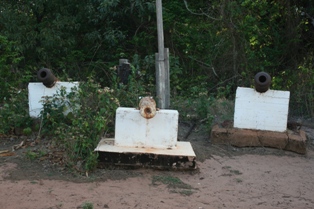Somerset, Queensland facts for kids
Quick facts for kids SomersetQueensland |
|||||||||||||||
|---|---|---|---|---|---|---|---|---|---|---|---|---|---|---|---|

The old cannons at Somerset
|
|||||||||||||||
| Population | 0 (2021 census) | ||||||||||||||
| • Density | 0/km2 (0/sq mi) | ||||||||||||||
| Postcode(s) | 4876 | ||||||||||||||
| Area | 463.5 km2 (179.0 sq mi) | ||||||||||||||
| LGA(s) |
|
||||||||||||||
| State electorate(s) | Cook | ||||||||||||||
| Federal Division(s) | Leichhardt | ||||||||||||||
|
|||||||||||||||
Somerset is a coastal area located in the very northern part of Queensland, Australia. It is split between the Shire of Torres and the Northern Peninsula Area Region. According to the 2021 census, Somerset has "no people or a very low population".
Contents
Exploring Somerset's Location
Somerset is the northernmost place on the Cape York Peninsula. This means it's the very top of mainland Queensland. However, it's not the northernmost place in Queensland overall. There are many islands further north in the Torres Strait that are also part of Queensland.
The famous Great Dividing Range mountain system starts just south of Cape York. It stretches all the way down to Victoria.
Getting Around Somerset
The Northern Peninsula Airport is located in the southern part of Somerset. It's managed by the Northern Peninsula Area Regional Council. This airport helps people travel to and from this remote area.
There are only a few main roads in Somerset:
- Pajinka Road: This road connects Cape York to the town of Bamaga.
- Somerset Road: This road leads from Pajinka Road to the historic Somerset settlement and Fly Point.
- Narau Beach Road: This road connects from Somerset Road to Narau Beach.
- Airport Road: This road links the town of Bamaga with the Northern Peninsula Airport.
Coastal Wonders and Islands
Somerset has a beautiful coastline with many interesting features. The northern part has headlands and beaches. The southern coast is mostly marshland.
Some important coastal spots include:
- Cape York: The very tip of mainland Australia.
- Punsand Bay and Evans Bay: Two of the many bays along the coast.
- Albany Passage: This water channel separates the mainland from Albany Island.
- Albany Island: An island near the coast with its own bays and points.
Mountains in Somerset
Somerset is home to a couple of mountains:
- Mount Bremer: This mountain is near the northern tip of the mainland. It stands about 115 meters (377 feet) tall.
- Mount Roma: Located in the north-west, Mount Roma is about 100 meters (328 feet) high.
A Glimpse into Somerset's Past
Before Europeans arrived, several Indigenous groups lived in this area. The Gudang people are one of these groups. Their language region covers parts of the Northern Peninsula Area, including Somerset.
In the 1870s, there were many Indigenous people living here. However, their population sadly decreased due to new diseases and conflicts. Early European settlers often had a difficult relationship with the Indigenous communities.
Why Somerset Was Founded
In 1859, Queensland became its own colony, separate from New South Wales. The new government wanted a direct shipping route to England through the Torres Strait. They also wanted a strong presence in the far north. This was important because other countries, like France, were setting up colonies nearby.
In 1862, Queensland's Governor, George Ferguson Bowen, chose a spot for a new settlement. He named it Somerset, after a British naval leader. The settlement was built across from Albany Island.
Early Days of the Settlement
Buildings were constructed, and land was sold in 1865 and 1866. John Jardine became the first Police Magistrate and land commissioner in 1864. He was in charge of law and order and land matters.
John Jardine's sons, Frank and Alick Jardine, explored the land from Rockhampton to Cape York. They were the first to bring cattle overland to the area. The Jardine River was named after them to honor their journey.
Frank Jardine's Life in Somerset
Frank Jardine took over as Police Magistrate in 1868. He married Sana Sofala from Samoa, and they had four children. The Jardine family lived in Somerset for many years.
Somerset was originally an important port. However, a safer shipping route was later found, and a new settlement was built on Thursday Island starting in 1876. This made Somerset less important as a port.
Even after Somerset was no longer a main government center, Frank Jardine continued to live there. He raised cattle, worked in the pearling industry, and grew coconuts. The Jardine family was known for helping travelers and sailors in this isolated region.
Remembering History
The Kennedy Memorial Monument was put up in 1948. It remembers Edmund Besley Court Kennedy and his difficult exploration of Cape York Peninsula 100 years earlier.
More recently, in 2014, the Angkamuthi, Atampaya, and Gudang/Yadhaigana groups had their native title rights recognized over a large area, including Somerset. This was an important step in acknowledging their long connection to the land.
Visiting Somerset Today
Today, Somerset is a quiet place. You can visit the historical ruins of the old Somerset homestead. This was a station started by John Jardine in 1863. It's about 35 kilometers (22 miles) north of Bamaga. It's a good spot for camping or a day trip, with facilities for barbecues near a beach.
Places of Historical Importance
- Somerset Graves Site: This site is listed as a place of heritage importance.
 | John T. Biggers |
 | Thomas Blackshear |
 | Mark Bradford |
 | Beverly Buchanan |


